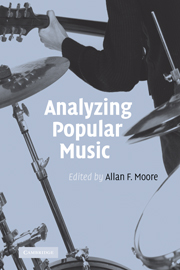Book contents
- Frontmatter
- Contents
- Acknowledgement
- Contributors
- 1 Introduction
- 2 Popular music analysis: ten apothegms and four instances
- 3 From lyric to anti-lyric: analyzing the words in pop song
- 4 The sound is ‘out there’: score, sound design and exoticism in The X-Files
- 5 Feel the beat come down: house music as rhetoric
- 6 The determining role of performance in the articulation of meaning: the case of ‘Try a Little Tenderness’
- 7 Marxist music analysis without Adorno: popular music and urban geography
- 8 Jethro Tull and the case for modernism in mass culture
- 9 Pangs of history in late 1970s new-wave rock
- 10 Is anybody listening?
- 11 Talk and text: popular music and ethnomusicology
- Bibliography
- Discography
- Film/Videography
- Index
6 - The determining role of performance in the articulation of meaning: the case of ‘Try a Little Tenderness’
Published online by Cambridge University Press: 22 September 2009
- Frontmatter
- Contents
- Acknowledgement
- Contributors
- 1 Introduction
- 2 Popular music analysis: ten apothegms and four instances
- 3 From lyric to anti-lyric: analyzing the words in pop song
- 4 The sound is ‘out there’: score, sound design and exoticism in The X-Files
- 5 Feel the beat come down: house music as rhetoric
- 6 The determining role of performance in the articulation of meaning: the case of ‘Try a Little Tenderness’
- 7 Marxist music analysis without Adorno: popular music and urban geography
- 8 Jethro Tull and the case for modernism in mass culture
- 9 Pangs of history in late 1970s new-wave rock
- 10 Is anybody listening?
- 11 Talk and text: popular music and ethnomusicology
- Bibliography
- Discography
- Film/Videography
- Index
Summary
The early history of ‘Try a Little Tenderness’
Although folklorists for several decades have been interested in trying to understand variations of a given text over different performances, this is a much understudied phenomenon within popular music scholarship. This chapter presents a case study which explores the range of variation in four different versions of the Tin Pan Alley standard ‘Try a Little Tenderness’, recorded over a span of thirty-three years. Ultimately, such an exploration forces one: (a) to question how and in what parameters musical meaning is articulated, and (b) to grapple with the collision between written and oral culture and private ownership in the form of intellectual property.
The genesis of this chapter goes back about fifteen years to the point when I first found out that one of the all-time classic soul recordings, Otis Redding's ‘Try a Little Tenderness’, was in fact a cover version of a Tin Pan Alley standard. This was a revelation for me on a number of levels, as the Tin Pan Alley and soul traditions seemed light years apart temporally, geographically and socially. I had first bought the Redding recording in 1966 when I was ten years old. At the time I implicitly assumed that the song was an original composition and, in later years when I began to actively wonder about such things, I explicitly assumed that the writers listed on the record's label, Connelly, Woods and Campbell, were obscure soul writers that I had not encountered, most likely black and from the Southern United States. I could not have been more incorrect.
- Type
- Chapter
- Information
- Analyzing Popular Music , pp. 103 - 130Publisher: Cambridge University PressPrint publication year: 2003
- 11
- Cited by



